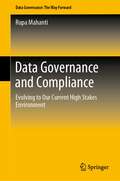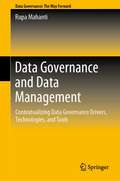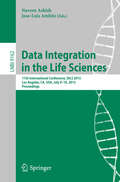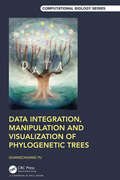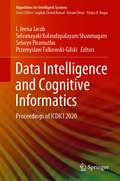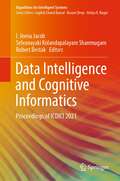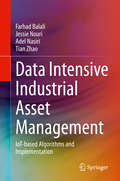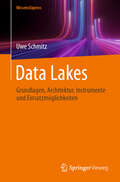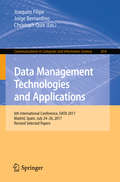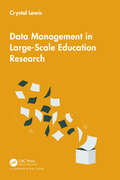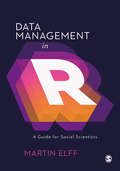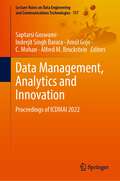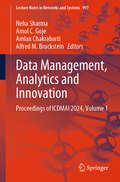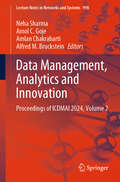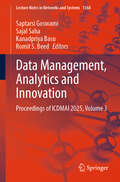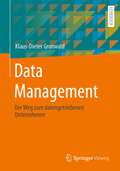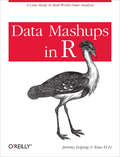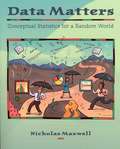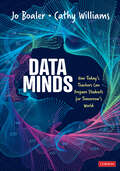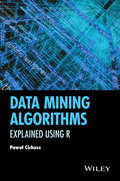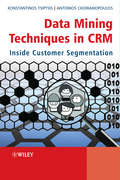- Table View
- List View
Data Governance and Compliance: Evolving to Our Current High Stakes Environment
by Rupa MahantiThis book sets the stage of the evolution of corporate governance, laws and regulations, other forms of governance, and the interaction between data governance and other corporate governance sub-disciplines. Given the continuously evolving and complex regulatory landscape and the growing number of laws and regulations, compliance is a widely discussed issue in the field of data. This book considers the cost of non-compliance bringing in examples from different industries of instances in which companies failed to comply with rules, regulations, and other legal obligations, and goes on to explain how data governance helps in avoiding such pitfalls.The first in a three-volume series on data governance, this book does not assume any prior or specialist knowledge in data governance and will be highly beneficial for IT, management and law students, academics, information management and business professionals, and researchers to enhance their knowledge and get guidance in managing their own data governance projects from a governance and compliance perspective.
Data Governance and Data Management: Contextualizing Data Governance Drivers, Technologies, and Tools
by Rupa MahantiThis book delves into the concept of data as a critical enterprise asset needed for informed decision making, compliance, regulatory reporting and insights into trends, behaviors, performance and patterns. With good data being key to staying ahead in a competitive market, enterprises capture and store exponential volumes of data. Considering the business impact of data, there needs to be adequate management around it to derive the best value. Data governance is one of the core data management related functions. However, it is often overlooked, misunderstood or confused with other terminologies and data management functions. Given the pervasiveness of data and the importance of data, this book provides comprehensive understanding of the business drivers for data governance and benefits of data governance, the interactions of data governance function with other data management functions and various components and aspects of data governance that can be facilitated by technology and tools, the distinction between data management tools and data governance tools, the readiness checks to perform before exploring the market to purchase a data governance tool, the different aspects that must be considered when comparing and selecting the appropriate data governance technologies and tools from large number of options available in the marketplace and the different market players that provide tools for supporting data governance. This book combines the data and data governance knowledge that the author has gained over years of working in different industrial and research programs and projects associated with data, processes and technologies with unique perspectives gained through interviews with thought leaders and data experts. This book is highly beneficial for IT students, academicians, information management and business professionals and researchers to enhance their knowledge and get guidance on implementing data governance in their own data initiatives.
Data Integration in the Life Sciences: 11th International Conference, DILS 2015, Los Angeles, CA, USA, July 9-10, 2015, Proceedings (Lecture Notes in Computer Science #9162)
by Naveen Ashish Jose-Luis AmbiteThis book constitutes the proceedings of the 11th International Conference on Data Integration in the Life Sciences, DILS 2015, held in Los Angeles, CA, USA, in July 2015. The 24 papers presented in this volume were carefully reviewed and selected from 40 submissions. They are organized in topical sections named: data integration technologies; ontology and knowledge engineering for data integration; biomedical data standards and coding; medical research applications; and graduate student consortium.
Data Integration, Manipulation and Visualization of Phylogenetic Trees (Chapman & Hall/CRC Computational Biology Series)
by Guangchuang YuData Integration, Manipulation and Visualization of Phylogenetic Trees introduces and demonstrates data integration, manipulation and visualization of phylogenetic trees using a suite of R packages, tidytree, treeio, ggtree and ggtreeExtra. Using the most comprehensive packages for phylogenetic data integration and visualization, contains numerous examples that can be used for teaching and learning. Ideal for undergraduate readers and researchers with a working knowledge of R and ggplot2. Key Features: Manipulating phylogenetic tree with associated data using tidy verbs Integrating phylogenetic data from diverse sources Visualizing phylogenetic data using grammar of graphics
Data Intelligence and Cognitive Informatics: Proceedings of ICDICI 2020 (Algorithms for Intelligent Systems)
by Selwyn Piramuthu I. Jeena Jacob Selvanayaki Kolandapalayam Shanmugam Przemyslaw Falkowski-GilskiThis book discusses new cognitive informatics tools, algorithms and methods that mimic the mechanisms of the human brain which lead to an impending revolution in understating a large amount of data generated by various smart applications. The book is a collection of peer-reviewed best selected research papers presented at the International Conference on Data Intelligence and Cognitive Informatics (ICDICI 2020), organized by SCAD College of Engineering and Technology, Tirunelveli, India, during 8–9 July 2020. The book includes novel work in data intelligence domain which combines with the increasing efforts of artificial intelligence, machine learning, deep learning and cognitive science to study and develop a deeper understanding of the information processing systems.
Data Intelligence and Cognitive Informatics: Proceedings of ICDICI 2021 (Algorithms for Intelligent Systems)
by Robert Bestak I. Jeena Jacob Selvanayaki Kolandapalayam ShanmugamThe book is a collection of peer-reviewed best selected research papers presented at the International Conference on Data Intelligence and Cognitive Informatics (ICDICI 2021), organized by SCAD College of Engineering and Technology, Tirunelveli, India, during July 16–17, 2021. This book discusses new cognitive informatics tools, algorithms, and methods that mimic the mechanisms of the human brain which leads to an impending revolution in understating a large amount of data generated by various smart applications. The book includes novel work in data intelligence domain which combines with the increasing efforts of artificial intelligence, machine learning, deep learning, and cognitive science to study and develop a deeper understanding of the information processing systems.
Data Intensive Industrial Asset Management: IoT-based Algorithms and Implementation
by Tian Zhao Farhad Balali Jessie Nouri Adel NasiriThis book presents a step by step Asset Health Management Optimization Approach Using Internet of Things (IoT). The authors provide a comprehensive study which includes the descriptive, diagnostic, predictive, and prescriptive analysis in detail. The presentation focuses on the challenges of the parameter selection, statistical data analysis, predictive algorithms, big data storage and selection, data pattern recognition, machine learning techniques, asset failure distribution estimation, reliability and availability enhancement, condition based maintenance policy, failure detection, data driven optimization algorithm, and a multi-objective optimization approach, all of which can significantly enhance the reliability and availability of the system.
Data Lakes: Grundlagen, Architektur, Instrumente und Einsatzmöglichkeiten
by Uwe SchmitzDas Buch bietet einen kompakten Überblick über Data Lakes und ihre vielfältigen Einsatzmöglichkeiten. Zielgruppe sind Studierende im Bachelor- und Masterstudium, IT-Mitarbeiter*innen und -Verantwortliche, Entscheider*innen und Führungskräfte, die sich einen Überblick über das Themenfeld Data Lakes verschaffen wollen. Das Buch vermittelt grundlegende Prinzipien für den Aufbau und die Gestaltung sinnvoller Data-Lake-Architekturen. Darüber hinaus werden Technologien und Komponenten vorgestellt, die typischerweise im Kontext eines Data Lakes zum Einsatz kommen. Das Buch zeigt Herausforderungen und Vorteile beim Einsatz von Data Lakes sowie die notwendigen technologischen und organisatorischen Voraussetzungen für die Implementierung und den Betrieb eines Data Lakes in Unternehmen auf. Die Produktfamilie WissensExpress bietet Ihnen Lehr- und Lernbücher in kompakter Form. Die Bücher liefern schnell und verständlich fundiertes Wissen.
Data Management Essentials Using SAS and JMP
by Kezik, Julie , MS and Hill, Melissa , MPH Julie Kezik Melissa Mph HillSAS programming is a creative and iterative process designed to empower you to make the most of your organization's data. This friendly guide provides you with a repertoire of essential SAS tools for data management, whether you are a new or an infrequent user. Most useful to students and programmers with little or no SAS experience, it takes a no-frills, hands-on tutorial approach to getting started with the software. You will find immediate guidance in navigating, exploring, visualizing, cleaning, formatting, and reporting on data using SAS and JMP. Step-by-step demonstrations, screenshots, handy tips, and practical exercises with solutions equip you to explore, interpret, process and summarize data independently, efficiently and effectively.
Data Management Technologies and Applications: 6th International Conference, DATA 2017, Madrid, Spain, July 24–26, 2017, Revised Selected Papers (Communications in Computer and Information Science #814)
by Joaquim Filipe Jorge Bernardino Christoph QuixThis book constitutes the thoroughly refereed proceedings of the 6th International Conference on Data Management Technologies and Applications, DATA 2017, held in Madrid, Spain, in July 2017. The 13 revised full papers were carefully reviewed and selected from 66 submissions. The papers deal with the following topics: databases, big data, data mining, data management, data security, and other aspects of information systems and technology involving advanced applications of data.
Data Management in Large-Scale Education Research
by Crystal LewisResearch data management is becoming more complicated. Researchers are collecting more data, using more complex technologies, all the while increasing the visibility of our work with the push for data sharing and open science practices. Ad hoc data management practices may have worked for us in the past, but now others need to understand our processes as well, requiring researchers to be more thoughtful in planning their data management routines.This book is for anyone involved in a research study involving original data collection. While the book focuses on quantitative data, typically collected from human participants, many of the practices covered can apply to other types of data as well. The book contains foundational context, instructions, and practical examples to help researchers in the field of education begin to understand how to create data management workflows for large-scale, typically federally funded, research studies. The book starts by describing the research life cycle and how data management fits within this larger picture. The remaining chapters are then organized by each phase of the life cycle, with examples of best practices provided for each phase. Finally, considerations on whether the reader should implement, and how to integrate those practices into a workflow, are discussed.Key Features: Provides a holistic approach to the research life cycle, showing how project management and data management processes work in parallel and collaboratively Can be read in its entirety, or referenced as needed throughout the life cycle Includes relatable examples specific to education research Includes a discussion on how to organize and document data in preparation for data sharing requirements Contains links to example documents as well as templates to help readers implement practices
Data Management in R: A Guide for Social Scientists
by Martin ElffAn invaluable, step-by-step guide to data management in R for social science researchers. This book will show you how to recode data, combine data from different sources, document data, and import data from statistical packages other than R. It explores both qualitative and quantitative data and is packed with a range of supportive learning features such as code examples, overview boxes, images, tables, and diagrams.
Data Management in R: A Guide for Social Scientists
by Martin ElffAn invaluable, step-by-step guide to data management in R for social science researchers. This book will show you how to recode data, combine data from different sources, document data, and import data from statistical packages other than R. It explores both qualitative and quantitative data and is packed with a range of supportive learning features such as code examples, overview boxes, images, tables, and diagrams.
Data Management, Analytics and Innovation: Proceedings of ICDMAI 2022 (Lecture Notes on Data Engineering and Communications Technologies #137)
by Alfred M. Bruckstein C. Mohan Saptarsi Goswami Inderjit Singh Barara Amol GojeThis book presents the latest findings in the areas of data management and smart computing, big data management, artificial intelligence, and data analytics, along with advances in network technologies. The book is a collection of peer-reviewed research papers presented at Sixth International Conference on Data Management, Analytics and Innovation (ICDMAI 2022), held virtually during January 14–16, 2022. It addresses state-of-the-art topics and discusses challenges and solutions for future development. Gathering original, unpublished contributions by scientists from around the globe, the book is mainly intended for a professional audience of researchers and practitioners in academia and industry.
Data Management, Analytics and Innovation: Proceedings of ICDMAI 2024, Volume 1 (Lecture Notes in Networks and Systems #997)
by Amlan Chakrabarti Neha Sharma Alfred M. Bruckstein Amol C. GojeThis book presents the latest findings in the areas of data management and smart computing, big data management, artificial intelligence, and data analytics, along with advances in network technologies. The book is a collection of peer-reviewed research papers presented at 8th International Conference on Data Management, Analytics and Innovation (ICDMAI 2024), held during 19–21 January 2024 in Vellore Institute of Technology, Vellore, India. It addresses state-of-the-art topics and discusses challenges and solutions for future development. Gathering original, unpublished contributions by scientists from around the globe, the book is mainly intended for a professional audience of researchers and practitioners in academia and industry. The book is divided into two volumes.
Data Management, Analytics and Innovation: Proceedings of ICDMAI 2024, Volume 2 (Lecture Notes in Networks and Systems #998)
by Amlan Chakrabarti Neha Sharma Alfred M. Bruckstein Amol C. GojeThis book presents the latest findings in the areas of data management and smart computing, big data management, artificial intelligence, and data analytics, along with advances in network technologies. The book is a collection of peer-reviewed research papers presented at 8th International Conference on Data Management, Analytics and Innovation (ICDMAI 2024), held during 19–21 January 2024 in Vellore Institute of Technology, Vellore, India. It addresses state-of-the-art topics and discusses challenges and solutions for future development. Gathering original, unpublished contributions by scientists from around the globe, the book is mainly intended for a professional audience of researchers and practitioners in academia and industry. The book is divided into two volumes.
Data Management, Analytics and Innovation: Proceedings of ICDMAI 2025, Volume 3 (Lecture Notes in Networks and Systems #1368)
by Saptarsi Goswami Sajal Saha Kanadpriya Basu Romit S BeedThis book presents the latest findings in the areas of data management and smart computing, big data management, artificial intelligence, and data analytics, along with advances in network technologies. The book is a collection of peer-reviewed research papers presented at 9th International Conference on Data Management, Analytics and Innovation (ICDMAI 2025), held during 17–19 January 2025 at St. Xavier’s College (Autonomous), Kolkata, India. It addresses state-of-the-art topics and discusses challenges and solutions for future development. Gathering original, unpublished contributions by scientists from around the globe, the book is mainly intended for a professional audience of researchers and practitioners in academia and industry. The book is divided into three volumes.
Data Management: Der Weg zum datengetriebenen Unternehmen
by Klaus-Dieter GronwaldDieses Lehrbuch betrachtet Data Management als interdisziplinäres Konzept mit Fokus auf den Zielen datengetriebener Unternehmen. Im Zentrum steht die interaktive Entwicklung eines Unternehmensdatenmodells für ein virtuelles Unternehmen mit Unterstützung eines online Learning Games unter Einbeziehung der Aufgaben, Ziele und Grundsätze des Data Managements, typischer Data-Management-Komponenten und Frameworks wie Datenmodellierung und Design, Metadaten Management, Data Architecture, und Data Governance, und verknüpft diese mit datengetriebenen Anwendungen wie Business Warehousing, Big Data, In-Memory Data Management, und Machine Learning im Data Management Kontext.Das Buch dient als Lehrbuch für Studierende der Informatik, der Wirtschaft und der Wirtschaftsinformatik an Universitäten, Hochschulen und Fachschulen und zur industriellen Aus- und Weiterbildung.
Data Mashups in R: A Case Study in Real-World Data Analysis
by Jeremy Leipzig Xiao-Yi LiHow do you use R to import, manage, visualize, and analyze real-world data? With this short, hands-on tutorial, you learn how to collect online data, massage it into a reasonable form, and work with it using R facilities to interact with web servers, parse HTML and XML, and more. Rather than use canned sample data, you'll plot and analyze current home foreclosure auctions in Philadelphia.This practical mashup exercise shows you how to access spatial data in several formats locally and over the Web to produce a map of home foreclosures. It's an excellent way to explore how the R environment works with R packages and performs statistical analysis.Parse messy data from public foreclosure auction postingsPlot the data using R's PBSmapping packageImport US Census data to add context to foreclosure dataUse R's lattice and latticeExtra packages for data visualizationCreate multidimensional correlation graphs with the pairs() scatterplot matrix package
Data Matters: Conceptual Statistics for a Random World
by Nicholas MaxwellWith an analytical approach that emphasizes concepts and comprehension, Data Matters provides a crucial introduction to statistics by preparing readers to think critically about the most common statistics found in the natural and social sciences. Real data and events taken from the daily news media bring relevance to the subject and turn the general reader into a critical and capable consumer of everyday statistics. With its pleasant, conversational style, Data Matters engages and interests readers while it covers the basics and lays a foundation for further study in statistics.
Data Minds: How Today’s Teachers Can Prepare Students for Tomorrow’s World
by Cathy Williams Jo BoalerDevelop curious minds. Empower every learner. Shape the future. How can we prepare students for a world where data-driven decision-making shapes nearly every aspect of life? Data Minds: How Today’s Teachers Can Prepare Students for Tomorrow’s World helps K–8 educators infuse data literacy into everyday lessons across disciplines, without overwhelming existing curricula. Data literacy is an ability and willingness to engage with and understand data in the world, and it can be incorporated throughout the school day to encourage student agency. Legendary educators Jo Boaler and Cathy Williams inspire teachers to develop "data minds" in their students—fostering analytical, creative, and skeptical thinkers who can successfully navigate the data-rich world. Aligned with current math, STEM, and GAISE II standards, this book Provides innovative, real-world stories from classrooms across the globe, offering inspiration and insight from other educators Highlights five key habits of mind that position students actively, giving them a role in seeking and investigating knowledge deeply Includes engaging and fascinating examples of data visualizations that demonstrate that data analysis goes way beyond charts and strings of numbers Offers flexible frameworks, including the Four-Part Data Cycle, that focus on asking questions, analyzing patterns, and developing multi-modal representations like graphs, maps, and even art pieces Presents extensive teacher "data moves," reflection questions, and examples in each chapter showing how to connect lessons to students’ interests, from oceanography to basketball Includes online access to free professional development resources and accompanying lessons through Stanford University’s youcubed From forming data questions to cultivating creativity, Data Minds will help educators turn every lesson into an opportunity for meaningful discovery. By integrating data literacy into the curriculum, teachers can unlock new levels of student engagement at the same time they are preparing learners for the demands of tomorrow′s workforce.
Data Minds: How Today’s Teachers Can Prepare Students for Tomorrow’s World
by Cathy Williams Jo BoalerDevelop curious minds. Empower every learner. Shape the future. How can we prepare students for a world where data-driven decision-making shapes nearly every aspect of life? Data Minds: How Today’s Teachers Can Prepare Students for Tomorrow’s World helps K–8 educators infuse data literacy into everyday lessons across disciplines, without overwhelming existing curricula. Data literacy is an ability and willingness to engage with and understand data in the world, and it can be incorporated throughout the school day to encourage student agency. Legendary educators Jo Boaler and Cathy Williams inspire teachers to develop "data minds" in their students—fostering analytical, creative, and skeptical thinkers who can successfully navigate the data-rich world. Aligned with current math, STEM, and GAISE II standards, this book Provides innovative, real-world stories from classrooms across the globe, offering inspiration and insight from other educators Highlights five key habits of mind that position students actively, giving them a role in seeking and investigating knowledge deeply Includes engaging and fascinating examples of data visualizations that demonstrate that data analysis goes way beyond charts and strings of numbers Offers flexible frameworks, including the Four-Part Data Cycle, that focus on asking questions, analyzing patterns, and developing multi-modal representations like graphs, maps, and even art pieces Presents extensive teacher "data moves," reflection questions, and examples in each chapter showing how to connect lessons to students’ interests, from oceanography to basketball Includes online access to free professional development resources and accompanying lessons through Stanford University’s youcubed From forming data questions to cultivating creativity, Data Minds will help educators turn every lesson into an opportunity for meaningful discovery. By integrating data literacy into the curriculum, teachers can unlock new levels of student engagement at the same time they are preparing learners for the demands of tomorrow′s workforce.
Data Mining Algorithms: Explained Using R
by Pawel CichoszData Mining Algorithms is a practical, technically-oriented guide to data mining algorithms that covers the most important algorithms for building classification, regression, and clustering models, as well as techniques used for attribute selection and transformation, model quality evaluation, and creating model ensembles. The author presents many of the important topics and methodologies widely used in data mining, whilst demonstrating the internal operation and usage of data mining algorithms using examples in R.
Data Mining Mobile Devices
by Jesus MenaWith today's consumers spending more time on their mobiles than on their PCs, new methods of empirical stochastic modeling have emerged that can provide marketers with detailed information about the products, content, and services their customers desire.Data Mining Mobile Devices defines the collection of machine-sensed environmental data pertainin
Data Mining Techniques in CRM: Inside Customer Segmentation
by Antonios Chorianopoulos Konstantinos K. TsiptsisThis is an applied handbook for the application of data mining techniques in the CRM framework. It combines a technical and a business perspective to cover the needs of business users who are looking for a practical guide on data mining. It focuses on Customer Segmentation and presents guidelines for the development of actionable segmentation schemes. By using non-technical language it guides readers through all the phases of the data mining process.
